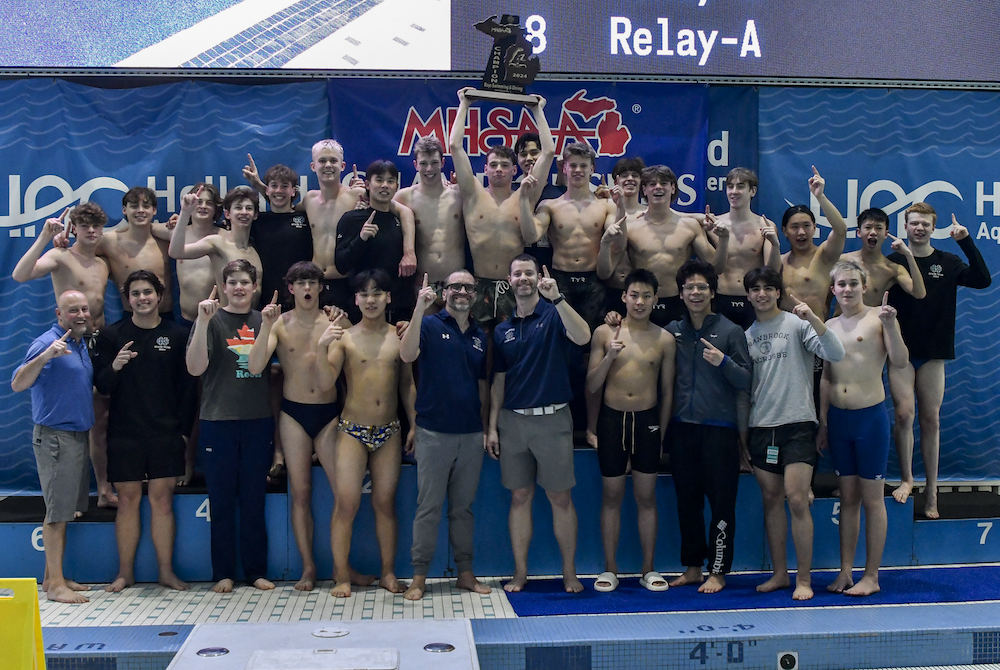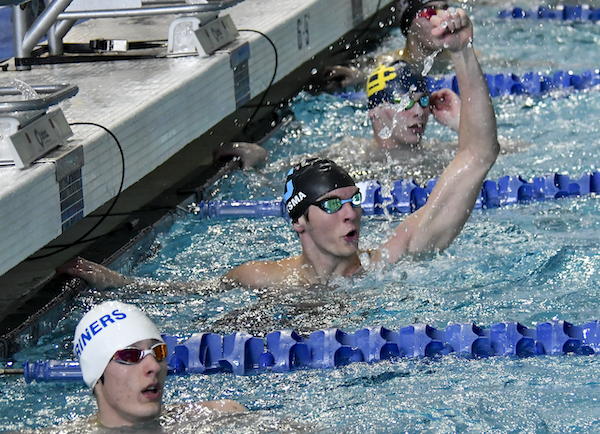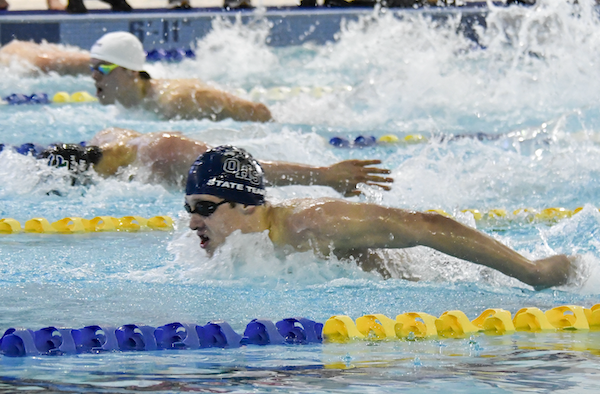
Powerful Voice for High School Sports
December 19, 2014
By Geoff Kimmerly
Second Half editor
Paul Carey was home from the U.S. Army only a few months and just shy of 25 years old when Beal City embarked on its first trip deep into the MHSAA boys basketball tournament.
On the call for local radio station WCEN from gyms at Saginaw Arthur Hill and Lansing Sexton, Carey served as the voice of the previously “laughable” Aggies as they reached the Class D Semifinals before falling just six points short of playing for the title.
“All of Beal City emptied out. They’d never had anything before,” Carey recalled during his annual Thanksgiving weekend visit to the MHSAA Football Finals at Ford Field. “When I got home, within the next two weeks I got a letter from every citizen of Beal City thanking me for broadcasting their games. That’s the kind of appreciation that meant so much.”
During 42 years on the airwaves, Carey was best known as a voice of the Detroit Tigers bounding out of transistor radios all over Michigan, thanks to WJR’s powerful signal.
But for the state’s high school sports community, his legacy is similarly memorable as the voice of the longtime football and basketball scoreboard show and a voter for various all-state teams and wire polls over the decades.
Now 86 and retired since 1991, Carey remains a regular during the first day of the Football Finals, taking in games he broadcast for the MHSAA during the late 1970s and that continue to hold his eye as they have for more than a half-century.
“It was a passion of mine. High school sports always has been,” Carey said. “I think because my dad was a high school coach, and teacher initially, and my brother was a high school coach and teacher, I just grew up in families that appreciated coaching and athletics. I was not a great athlete, but it kept my hand in following sports that way.”
Now, the scores
Carey partnered with Ernie Harwell for Tigers radio broadcasts from 1973-91, including during the march to the 1984 World Series championship. He was named Michigan Sportscaster of the Year six times and to the Michigan Sports Hall of Fame in 1992.
But Carey’s early career included sitting on top of a car, plugged into a phone pole, for a Sacred Heart football game at old Fancher Field just a few blocks from his family’s Mount Pleasant home. Among many more accolades are a Distinguished Service Award from the Michigan High School Coaches Association and a place in the Basketball Coaches Association of Michigan Hall of Fame.
In fact, the start of his weekly announcing of statewide football and basketball scores preceded his baseball career by 16 years and ended two months after he announced his final professional out.
The Michigan High School Scoreboard show was a staple of WJR’s late Friday nights from 1957-91. Carey would read every score he could collect from a variety of sources, often organized by league and with state rankings and context mixed in.
His idea came from something similar read by Len Colby for Kalamazoo’s WKZO. Carey’s brother Terry was coaching at Niles during the second half of the 1950s, and he and other coaches would get together to listen to the Friday night scores from the southwestern part of the state.
Carey, who left WKNX in Saginaw for WJR in 1956, explained to then-sports director Bob Reynolds that the station’s strong signal could provide for a truly statewide scoreboard experience.
Carey then connected with Edgar Hayes of the former Detroit Times, who gave the OK for Carey to call the paper on Friday nights to get scores from the Detroit metro area. For the rest, Carey relied on wire services – there were three at the time – who relied on newspapers from all over Michigan to call in scores over the course of an evening.
Before every Friday during high school football season – and later Tuesdays and Fridays during boys basketball season – Carey typed up lists of games based on schedules in the newspaper, with spaces to add scores. More than a few times, Carey raced down a back ramp at Tiger Stadium after a Friday night game, back to the WJR studio, with 15 minutes to prep for the show’s 11:30 p.m. start.
“If the Flint Journal, the Grand Rapids Press, the Traverse City paper didn’t call in scores to the AP, then I was out of luck too. And that happened all the time,” Carey said. “I would call back occasionally, say, ‘Did you get anything more?’ It was a rat race.”
The show originally was set for 10 minutes and then extended to 15. American Airlines sponsored a record show that followed, and Carey’s scoreboard show had a sponsor only once in 35 years. Finishing up on time was expected, even with more than 200 scores to read.
But Carey said he always went 20 minutes, sometimes 25.
“Because I wasn’t done. I just kept right on going,” Carey said. “Jay Roberts did the all-night show most of the time, and he was patient with me. He didn’t say too much on the air about ‘that guy ahead of me took all of my time.’”
Carey continued the “rat race” until his final scoreboard show, Dec. 20, 1991. He retired from WJR at the end of that calendar year. And it's important to note: Carey was never paid a dime extra for doing the program. .
“I think Paul is really just a sports fan, and that came across to the listener on his broadcasts,” MHSAA historian Ron Pesch said. “Paul would gather as much as possible off the wire. He'd interject if scores were missing from sections of the state. Press polls from the Free Press, News, AP and UPI were big, so he could point out close calls and upsets.
“He provided immediacy, or the closest thing to it in the days before cable TV and the Internet, and because of his scoreboard show, you could get the results before the morning paper. For listeners, he brought life to something as simple as game scores.”
First team all the way
Carey, who resides in Rochester, also served as the engineer on Tigers broadcasts for 16 years, through 1990. He broadcast Pistons games on the radio for six seasons and did the first broadcast of a Central Michigan University football game, in 1949.
Harry Atkins, covering Detroit’s teams while with The Associated Press for 29 years including the last 21 as its sports editor for Detroit, took note of his colleague's hard work – and especially that Carey was one of few broadcasters who was a journalist in addition to a voice.
That made Carey's other major role in high school sports a natural fit.
Atkins split The Associated Press all-state selection panels for football and basketball into 11 regions, and Carey represented the Detroit area for a number of years. He also was a longtime voter in those sports' weekly polls.
“Paul is just that kind of guy. He thought it was important and he made time in his busy schedule to do it,” Atkins said “And it had an impact on the other 10 voters on the All-State panels, too.
“Some of them were from small out-state newspapers or radio or TV stations. Yet every one of them knew who Paul Carey was. And when he spoke, of course, with what often is called "The Voice of God," those voters paid attention.”
And he still does, as well.
At the end of each fall, Carey still puts together a compilation of the three high school all-state football teams – Associated Press, Detroit Free Press and Detroit News – and files them with years of research and results.
“It’s important to me. Nobody sees it but me, but I get a certain kick,” Carey said. “Once in a while I’ll see a kid playing at Central, Western or (Michigan) State or Michigan, and they’ll say he came from Clawson. I’ll go into my all-state collections, say that would’ve been 2009 he played, and I find a name.”
In addition to the Football Finals on WJR, Carey was part of the Baseball Finals broadcasts into the early 1990s, continuing to contribute even after his retirement from his fulltime gig.
He spent high school games over the years sitting next to legends like the Free Press’ Hal Schram and remembers when current Free Press longtime scribe Mick McCabe was just a rookie. One of Carey's final broadcasts was a 1992 Baseball Final with his nephew Mike Carey, who continues to broadcast MHSAA championship games to this day.
“I am eternally grateful to Paul Carey. His contribution to high school sports in Michigan has been great and significant,” Atkins said.
“We are lucky to have him.”
PHOTO: Paul Carey (left) and nephew Mike Carey broadcast the MHSAA 1992 Class D Baseball Final between Hillman and Athens for PASS.

Cranbrook Pulls Far Ahead for Repeat, GR Christian's Sytsma Adds to Title Total
By
Dean Holzwarth
Special for MHSAA.com
March 9, 2024
HOLLAND – The Bloomfield Hills Cranbrook Kingswood boys swimming & diving team cleared a major hurdle last year in winning the Lower Peninsula Division 3 Finals by a narrow margin.
This year, the role of favorite suited the Cranes just fine as they rolled to a repeat Saturday at Holland Aquatic Center.
Cranbrook put forth an impressive all-around effort and finished with 380 points to overwhelm the rest of the field.
East Grand Rapids (243) edged Holland Christian (211) for second place, while Adrian (151) finished fourth.
“I think last year, when we got over that hump and we won the meet, we saw what we had coming back,” Cranbrook coach Paul Ellis said. “I feel like the boys were a lot more relaxed all season. We didn't have that ‘we’re chasing it’ mindset, and it was about widening the gap and the boys did a phenomenal job.
Cranbrook won two individual events with seniors Andrew Delzer (100-yard breaststroke) and Colin Zexter (100 backstroke) and collected relay titles in the 200 medley and 400 freestyle.
“We had great leaders on our team,” Ellis said. “We had a couple seniors come in that haven't swam for us before, and they really helped bring us all together. They are all team players, they care about their teammates and they bust their butt and set a good example that helped everyone make a huge step forward in terms of training and in bringing that team atmosphere together.
“It helped in how they swam. We had so many lifetime bests this weekend and throughout the season, and it was really fun. It was an enjoyable season.”
 Delzer and Zexter joined Joseph Wiater and Will Farner on the 200 medley and AJ and Will Farner on the 400 relay.
Delzer and Zexter joined Joseph Wiater and Will Farner on the 200 medley and AJ and Will Farner on the 400 relay.
“All of our seniors stepped up and were scoring points, and we had a blast,” Delzer said. “There definitely was a target on our back, but we weren't going to let anyone hunt us down. It was a privilege to be in that position, and we had a great time doing it.”
This was Zexter’s first year on the Cranbrook team after swimming club previously.
“This one was amazing, and it's my first one,” Zexter said. “I did high school just to have fun, and the whole team this season was like family. We were so close, and to have the perfect season and be undefeated is the best feeling.”
Grand Rapids Christian’s Ben Sytsma was named Swimmer of Meet by the Michigan Interscholastic Swim Coaches Association after a dominating performance to cap off an illustrious career.
Sytsma added two more individual titles to his career total by winning the 50 and 100 freestyle events. He also helped the Eagles to a victory in the 200 freestyle relay and a runner-up effort in the 400.
His time of 43.87 in the first 100-yard leg of the 400 relay was an LP Division 3 Finals record. He finished his high school career with four individual championships and having been part of three relay winners.
“I really just wanted to go out with a bang,” Sytsma said. “The boys and I worked really hard, and I was really proud of how they did.
“We really wanted to win those relays. We came up short in the 400, but beat our school record so I think we are all very satisfied with how it ended up.”
 Sytsma recorded a time of 19.98 in the 50 and became only the second swimmer in meet history to break 20 seconds.
Sytsma recorded a time of 19.98 in the 50 and became only the second swimmer in meet history to break 20 seconds.
“That was Cam Peel (in 2019), and I always looked up to him as an idol and followed his career,” Sytsma said. “I wanted to be like him in that 50, break 20, and I wasn't the first to do it, but I was the second one so I’m happy with that.
“There were definitely goals I had coming into this meet, state records I was looking at. I came up short in the 50 and that 100 record in the final relay was really emotional for me. I was happy with myself.”
East Grand Rapids placed runner-up for the second straight year.
“Second place in this year’s meet is all you could hope for,” Pioneers coach Milton Briggs said. “Cranbrook is definitely far and away better than all of us, so for us to come in and take second among this talent, you have to feel good about that. We knew it was going to be close between us and Holland Christian.”
East Grand Rapids was led by senior Carter Kegle, who won the 500 for the third consecutive year and claimed top honors in the 200 freestyle.
Otsego sophomore Liam Smith won two individual titles. He repeated in the 100 butterfly (48.02) and also swam to victory in the 200 IM (1:48.64).
Chelsea senior Mitch Brown defended his diving title. He recorded a score of 503.05 to finish ahead of runner-up Carson Reynolds of DeWitt.
PHOTOS (Top) Cranbrook Kingswood celebrates its victory Saturday at Holland Aquatic Center. (Middle) Grand Rapids Christian's Ben Sytsma looks to the scoreboard and celebrates. (Below) Otsego's Liam Smith, bottom, pulls away for the win in the butterfly. (Click for more from High School Sports Scene.)

